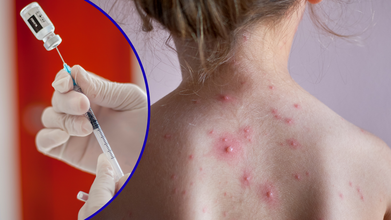- Health Conditions A-Z
- Health & Wellness
- Nutrition
- Fitness
- Health News
- Ayurveda
- Videos
- Medicine A-Z
- Parenting
Free Chickenpox Vaccine In England: UK Medical Officer Backs Prevention Against ‘Life-Threatening’ Illness

(Credit-Canva)
UK government has launched a health initiative will provide eligible children vaccination to fight measles, mumps, rubella and chickenpox from 2026 January. This initiative aims to help “raise the healthiest generation of children ever, while reducing sick days and time parents take off work” says Gov UK.
Backing this UK’s the chief medical officer (CMO), also posted his opinions on X, reposting one of NHS’s posts announcing the initiative.
In the post he mentioned that “Chickenpox is common. Usually it is just unpleasant, but it can be severe or life threatening. A long-established vaccine to prevent it will be offered to all children rather than only those who can pay. Immunity by vaccination is safer than by infection.”
Why This Chickenpox Vaccination Drive Is Important?
Starting in January 2026, the UK government will launch a new vaccination program to protect children against chickenpox. The program will reach about half a million children each year and will use a combined vaccine that also protects against measles, mumps, and rubella (MMRV).
This new initiative is designed to help create a healthier generation of children. By preventing chickenpox, the program will reduce sick days for kids and cut down on the time parents have to take off work to care for them.
Also Read: People In Texas Could Soon Buy Ivermectin Without Any Prescription: What You Need to Know
Who Is Eligible for This Chickenpox Vaccine?
The new vaccine will be given to eligible children during their routine doctor's appointments. The rollout is expected to save the National Health Service (NHS) an estimated £15 million each year in treatment costs for chickenpox. It will also help the UK economy by reducing the an estimated £24 million in lost income and productivity from parents missing work.
This chickenpox vaccine has been used safely for decades in many other countries, including the United States, Canada, Australia, and Germany. These countries have seen a major drop in both chickenpox cases and hospitalizations since they started their own vaccination programs.
Stephen Kinnock, the Minister of State for Care, stated that the program gives parents "the power to protect their children from chickenpox and its serious complications, while keeping them in nursery or the classroom."
Is Chickenpox Life-Threatening?
While most people think of chickenpox as a mild illness, it can lead to serious complications. It can lead to severe complications that require a hospital stay, such as serious infections, brain swelling, or even a stroke. In rare cases, it can even be fatal. The government’s decision to offer this vaccine is based on expert advice from scientists who studied the serious impact of chickenpox on children's health.
The decision to add the chickenpox vaccine to the routine schedule was based on expert advice from the Joint Committee on Vaccination and Immunisation (JCVI). Currently, a private chickenpox vaccination can cost around £150, but with this new program, it will be available for free on the NHS.
This is the first time a new disease has been added to the routine childhood vaccination program since the meningitis B vaccine in 2015. It is a major part of the government's wider goal to improve the nation's health and shift the focus of healthcare from treating sickness to preventing it.
Flu A Is Ramping Up, Experts Warn That It Could Cause Widespread Disease

Credits: iStock
Flu A, or the new version of the flu virus called H3N2 is spreading quickly, the worst part is that fewer people are getting the flu shots. Doctors and scientists say that this year's influenza season could be tougher than the usual. Dr. Amanda Kravitz, a pediatrician at Weill Cornell Medicine in New York in an interview to CBS Mornings, said, "This flu season is no joke. We are seeing more cases than we would expect for this time of year. We are seeing influenza A, and within influenza A we are seeing a subtype or variant called H3N2."
Scientist Jesse Bloom, at the Fred Hutchinson Cancer Center who studies viral evolution said that "it is pretty likely to be an H3N2-dominated flu season. I don't see any reason to think that this is an unprecedentedly bad one, but current indicators are that it may be substantially more severe than the typical winter flu season," as reported by CBS News.
Also Read: Adenovirus: Why This Mysterious Virus May Spread Faster Than Covid-19 And Flu
Not just the UK, but as per the journal of the British Medical Association, even the United Kingdom is suffering from an early and severe fly season, all thanks to the influenza A H3N2 called subclade K. Neil Maniar, director of the master of public health program at Northeastern University said, "The United Kingdom got hit pretty hard by this," as well as Europe and Australia. "I think that's a pretty good harbinger of what we are likely to see here. This is going to be a very difficult flu season."
Experts are pointing out that while the vaccine may not be a good match for the updated flu virus circulating, it is still the best line of defense. Flu vaccines have an efficacy rate of 40% to 60%, however, as per as early report by Eurosurveillance, the efficacy of the current vaccine rate was between 32% to 39% in adults, and 72% to 75% in children. However, it is still important to get the vaccine to avoid any severe illness from the flu virus, point out experts.
"If you haven’t done so, get (the vaccine)," Maniar pointed out. “Definitely get it as we go into the holidays, as we go into new year’s and the new school year." It takes about two weeks to build up a solid immune response, however, within several days of getting the vaccine, people start to develop some immunity.
Read: Flu Cases In US Reach 5 Million Mark, Reveals CDC Data
The Virus Is Changing
Dr Helen Chu, a flu expert at the University of Washington told the CBS News that based on the UK and Japan data, there will be more cases of hospitalization by this flu. The flu activity is "starting everywhere right now" and would be overlapping with RSV, before the winter COVID-19 wave.
Trevor Bedford, who also studies viral evolution at the Fred Hutchinson Cancer Center, said H3N2 tends to evolve faster than other influenza strains. "I expect more H3 incidence than the typical year and poorer vaccine effectiveness," he said.
"Total season effectiveness is probably going to actually be much, much lower," Chu warned, because immunity fades over time.
However, despite the mismatch in the vaccine, experts stress the fact that the flu vaccine is still helping preventing severe illness, especially in children. They also help in preventing severe diseases, hospitalization and deaths.
Barry Manilow Is Diagnosed With Lung Cancer At 82

Credits: Wikimedia Commons
Barry Manilow, singer, has been diagnosed with lung cancer and will be undergoing a surgery for the same. He announced this update on his social media post on Monday. Currently 82, he said he had been fighting bronchitis for more than two months, and it was when his doctor ordered an MRI that the test "discovered a cancerous spot on my left lung that needs to be removed. It is pure luck (and a great doctor) that it was found so early."
He said that doctors do not think that the cancer had spread and that he will have additional tests to confirm the diagnosis.
Also Read: Adenovirus: Why This Mysterious Virus May Spread Faster Than Covid-19 And Flu
“No chemo, No radiation. Just chicken soup and I Love Lucy reruns,” he wrote.
However, Manilow did not mention when he would be having the surgery, however, he is expected to rest for a month to fully recover from it. This means the nine concert dates that are scheduled for January could be postponed. “Just like you, we were all looking forward to the January shows and hate having to move everything around,” he wrote. However, no other information on the rescheduled concert dates were provided.
What Is Lung Cancer?
As per the Centers for Disease Control and Prevention (CDC), lung cancer begins in the lungs and may spread to lymph nodes or other organs in the body, including brain too, if not caught early. Cancer cells from other organs too could spread to the lungs, this process is called metastases.
Also Read: FDA Approves Wegovy Pill For Weight Loss; What Difference Does It Make?
In lung cancer, uncontrolled growth of abnormal cells in the lung tissues, usually in the lining of air passages, forms tumors that disrupt normal breathing and can spread to other parts of the body. This is also the leading cause of cancer death.
There are several types of cancer, and in lung cancer, there are two main types called:
- Small cell Cancer
- Non-small Cell cancers: including adenocarcinoma, squamous cell carcinoma, and large cell carcinoma
These types of cancer grow differently and are treated differently. Non-small cell lung cancer is more common than small cell lung cancer. Manilow, however, did not specify the type of lung cancer he has been diagnosed with, neither did he mention the stage of lung cancer he has been diagnosed with. However, he did note that the cancerous spots were found early on.
What Are The Common Symptoms Of Lung Cancer?
No cancer journey is the same, so people too ca have different symptoms for lung cancers. Some people may have symptoms related to lung cancer, whereas others won't feel a thing until it has spread to other parts of the body. Some people just have general symptoms of not feeling well. However, there are certain common symptoms that some people may experience, they include:
- Coughing that gets worse or doesn't go away.
- Chest pain.
- Shortness of breath.
- Wheezing.
- Coughing up blood.
- Feeling very tired all the time.
- Weight loss with no known cause.
Other changes that can sometimes occur with lung cancer may include repeated bouts of pneumonia and swollen or enlarged lymph nodes (glands) inside the chest in the area between the lungs.
If you experience any of these signs, it is best that you speak to your doctor and get your tests done.
FDA Approves Wegovy Pill For Weight Loss; What Difference Does It Make?

Credits: iStock
Wegovy pill is now approved by the US Food and Drug Administration (FDA). On Monday, the FDA approved a daily pill version of Novo Nordisk's weight loss drug Wegovy, which is now introducing a new option for patients, that is said to revolutionize weight loss medicine and obesity treatment.
The weight loss pill uses the same active ingredient. semaglutide. The same active ingredient powers the original Wegovy and sister drug for diabetes, Ozempic. Rival company Eli Lilly is also in the process of getting its weight loss drug approved, which will be out in the market by 2026, the CEO had said. Eli Lilly is known for drugs like Zepbound and Mounjaro. In the US, notes health policy research group KFF, at least 1 in 8 Americans are currently taking one of these medicines.
Also Read: Adenovirus: Why This Mysterious Virus May Spread Faster Than Covid-19 And Flu
Wegovy Pill's Benefits And When Can People Buy It?
The Wegovy pill showed similar weight loss results as well as the side effects as in the Wegovy shot. The drug will be available by prescription in the US by January, said Novo Nordisk. Dr Jason Brett, who is the principal US medical head for Novo Nordisk told CNN in an interview, "We believe it will expand access and options for patients. We know there are some patients who just won’t take an injectable medication.”
The starting dose of the weight loss Wegovy pill will cost $149 for patients who will be paying out of the pocket. This is under the November agreement announced by the Trump administration. The drug will become pricier via self-pay as doses increase, though Novo Nordisk has not disclosed its prices yet. Patients whose insurance covers the medicines will be paying a lower copay.
The Wegovy weight loss pill is one of the two GLP-1 pill which will hit the market, along with Eli Lilly's orforglipron.
Whose Weight Loss Pill Is More Effective?
While the pills have not been compared head to head in an clinical trial, there have been separate studies done on them. The Wegovy pill showed an average weight loss of 14% over 64 weeks, when compared for a placebo, which showed 2% weight loss. Whereas, orforglipron showed 11% weight loss over 72 weeks on its highest dose, as compared to 2% with placebo.
Wegovy injection on the other hand showed a weight loss of 15%, whereas, Zepbound showed 21% on his highest dose. Placebo remained at 2% and 3%, respectively in comparison with both the drugs.
What Changes And What Remains The Same On Weight Loss Drug?
Side effects, including gastrointestinal issues like nausea and vomiting remain the most common ones with GLP-1 drugs, which was also seen in the studies of the pill as well. The clinical studies showed that 7% of participants on Wegovy pill stopped the treatment because of side effects, verss 6% on placebo. In orforglipron's study, up to 10% of patients stopped treatment, as compared with 3% on placebo.
The key difference with the pill is that it must be taken on an empty stomach with a small amount of water, and patients are not directed to eat, drink, or take any other medicines for the next 30 minutes after taking it.
Doctors have pointed out that a pill version of semgalutide approved for diabetes called Rybelus has not been used as widely as Ozempic in part because of these restrictions. Eli Lilly however says that in clinical trials, orforglipron was taken once a day at any time, without restrictions on food or water.
© 2024 Bennett, Coleman & Company Limited

